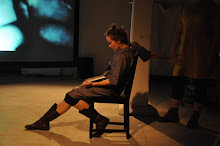Let's just say that there would be a point to setting an old, 18th-century opera in the Abu Ghraib detention center. So that, say, the men's chorus wears American cammo gear, tortures "prisoners" and takes pictures of themselves with the prisoners using their cellphone cameras. Assuming that this opera would be possible, to use my favorite graduate school query -- what WORK would this do? Culturally, socially, artistically, what would this accomplish? My sense is that in a very cool world, a journalist working in Iraq could ferret out something like the scandal at Abu Ghraib and stage an opera about it in the middle of Central Park in front of all the press in New York City BEFORE the whole thing got past the censors. That would really be something. Here would be an opera with something essential to report. But what about staging an Abu Ghraib opera now? Hm ... it ... reminds us? It ... forces us to witness unspeakable acts? But with what intention? To what purpose?
The Komische Oper is showing Barrie Kosky's staging of Iphigenie auf Tauris, and I wanted to like it, but it was sheer horror. Whether sheer horror can be productive onstage is a question better left to more capable, scholarly hands, but let me just tell you what I mean.
The plot: Thoas, the king of Tauris, learns from an oracle that he'll be killed by a friend of his. Life on his island accordingly becomes a real reign of terror: anyone who arrives is immediately killed without ceremony. But the task of killing is given to poor Iphigenia, who happens to be there too (sister to Elektra, daughter of Agamemnon, daughter of Clymenestra: even for Greek tragic history this family is F.U.B.A.R.). Her brother arrives on the island with a pal of his. No one recognizes anyone else. Iphigenia is on the verge of killing her brother when they figure out what's going on, and that's the end. (Happy tragedy, sort of.)
So Kosky's brainchild. The people living on Tauris are at Abu Ghraib, and they live in fear of their lives. They look terrible. The king's cronies/American soldiers jaunt around poking their guns at people. They stick bags over prisoners' heads, they pee on the prisoners, they make them do horrible things. Now, just when things couldn't get worse, they go off the deep end. A 70-year-old naked woman walks slowly onstage. She looks ghastly. Following her is a 70-year-old naked man, also looking ghastly. They remain onstage either dancing together, attempting to comfort the principals, or simply staring into space for the remainder of the opera and generally making everyone uncomfortable. For awhile I thought Tauris was a particular version of hell in which Persephone & Hades are a rumpled old couple wandering around uselessly underground. This idea seemed interesting. But then, in a later scene, another dozen old people walk onstage during Orestes' aria and play horrible games with him. I won't describe what goes on because it's unmentionable. In another scene, prisoners plant small, scrubby, blood-red trees onstage using dirt and ... blood.
I will say one unconditionally good thing, which is that Iphigenia and Iphigenia's voice are two separate people. There's Iphigenia the actress, and then Iphigenia the singer, who stands to the side of the stage. The rest of the singers have their voices. I won't say I found this device particularly telling, since I'm not sure what it was for, even if the effect was cool (you hear Iphigenia singing, but when you look at her she's just straining to speak without being able to say anything...) But the woman playing Iphigenia was absolutely tremendous and I can't imagine anyone else who could stare out at an audience for two hours with as much force.
Subscribe to:
Post Comments (Atom)




1 comment:
Majel,
at a loss for blog-related commentary...i wanted to say hello.
Post a Comment